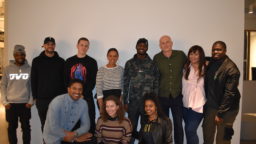Last October, Funky Friday by young British rapper Dave was the first independent single in three years to go straight in at No.1 on the UK’s Official Singles Chart.
In March, his debut album, Psychodrama, hit the top of the Official Albums Chart with multiple five star reviews, one of which hailed it as “the boldest and best British rap album in a generation”. It’s since been nominated for the prestigious Mercury Prize, which will be revealed in September.
In a market that has recently struggled to break new talent, Dave is proof that it’s still possible for the cream to rise to the top.
Abundant artistic talent is only part of the story, of course, and behind the rapper is a promising London-based label and management company, Neighbourhood, helmed by Jack Foster and Benny Scarrs.
The ambitious duo, who were honoured with the A&R Of The Year: Hip-hop/ Grime gong at MBW’s UK-focused A&R Awards in November, formed Neighbourhood in 2016. Scarrs and Foster had spent 10 years in A&R and management respectively and met when Scarrs signed Tinchy Stryder (then a management client of Foster) to Island Records in 2008.
They decided to partner with Jack Street and Sam Evitt (who manage Sam Smith, Disclosure and Jimmy Napes) in 2017. Foster has known Street from the day he was born, quite literally, thanks to a friendship between their parents. He says: “I have not known a life without knowing him so I guess there was a good amount of trust there to partner up!”
Foster and Scarrs discovered a then 17-year-old Dave in 2015 while watching YouTube videos and coming across his poignant and personal SBTV freestyle.
“We hadn’t seen a rapper that good from the UK, ever,” says Foster. “Some of the things he was saying really connected with you, there was meaning and emotion straight away and it was different.”
The development plan has been influenced by Dave himself “who is very analytical, he had a sense of the steps and stages he needed to take,” says Scarrs.
That started with setting a strong foundation as a respected rapper by doing freestyles, before creating a buzz by consistently releasing music from 2016 onwards, including collaborations with AJ Tracey, J Hus, MoStack, and then Fredo.
The latter featured on Funky Friday which was the first new music Dave had released in seven months — a rare lengthy break — and demand peaked.
Scarrs explains: “Dave had created a pretty insane buzz from the records he’d had out previously, and then we didn’t really release anything for the rest of the year and didn’t play many shows either. There was an appetite and a demand that hit fever pitch when Funky Friday was released.”
Fredo was steadily building his own career too, and the collaboration had been teased for months through Snapchat pictures in the studio together, resulting in a perfect storm.
When it came to the album, Psychodrama, the element of surprise was brought into play. Scarrs explains: “Something we talked about a lot is that it’s exciting when things are surprising, but so often nowadays we are given so much information so far upfront.
“Also, there is so much music coming out every week, and especially in the run that we were in, there were a lot of records that were going to be important. So what we tried to do is be as exciting as possible and make it as much of a ‘moment’ for the audience as possible.”
He continues: “People knew an album was coming at some point, Dave has mentioned it, but he’d never been specific, so we chose not to do a long pre-order or big announcement the other side of 2018. We chose to try and keep it quite condensed and announce the album with the first single, Black, and put the album out within two weeks of that record dropping.”
It’s a strategy that worked — Psychodrama made it to the top on just over 26k combined sales, 79% of which came from streams, despite a fierce chart battle with the new album from Foals, and releases from Dido and Sigrid.
Foals finished just 279 copies behind, and benefited from pre- orders after announcing the album in January. Their label, Warner Bros./Transgressive pulled out all the stops to try and make it to No.1, including bundling tour tickets with the album, which is a strategy Dave steered clear of.
“I think a lot of options that are available to artists to really drive people to buy your album in week of release, especially when you’re in a chart battle, are probably not that reflective of people thinking this is a good piece of music and then going and buying it,” says Scarrs.
The same issue was raised in the US last year by Nicki Minaj, who criticised Travis Scott for bundling his album in with merchandise and pre-sale ticket access to his upcoming Astroworld tour – a tour which, to Minaj’s fury, had yet to be officially announced.
Scarrs continues: “Those things are chart eligible, but it doesn’t feel like the focus is on the music or the records at that point. It creates a strange dynamic. Dave’s level of integrity is very high; he doesn’t want to do things that are making him compromise who he is, what he stands for or how he wants to deliver his music to his audience.
“There were many things we could have done in that week that we didn’t do because it wasn’t sitting right with Dave, and we understood and respected that.”
Instead, Dave was out on the streets and in stores meeting fans. “These were reactionary moves, so every time we saw a ticket bundle go up for however many thousand tickets, it’s like okay, we’ve got to respond to this somehow,” Scarrs explains.
“I think that [the Official Charts Company] should probably have a look at all of that because if the chart isn’t about people thinking, ‘I’m going to go and buy this album because I love it and I love this artist,’ it becomes about something else.”
Neighbourhood’s releases are exclusively distributed through Universal Music.
Have they been tempted to sign Dave to a major label deal at any point? Scarrs says: “Why would you? I’m not saying any artist doesn’t need something from a major label, major labels are incredible, obviously, but we’d done the first two EPs independently and we learned a lot from that and were able to block out a lot of noise.
“It’s a very small team, we are very focused, able to be very nimble and do things really cheaply as well. It just felt good being able to run the first couple of projects like that.”
Foster continues: “And we had a team that we believed could deliver what we needed, which we’ve built slowly over the last three years. [Me and Benny had] both worked with a few different labels and realised it’s more about the people you’ve got in there, it’s not some magic where if you are signed to a major label you now get all this extra work.
“The people we had felt just as good as any people we’ve ever worked with across the last 10 years, so why change that?”
Those people include the other members of the Neighbourhood team — operational/marketing exec James Walsh, and Ruby Atkin and Justin Scott who work across label and management.
The plan for Dave this year has already featured a sold out UK tour that closed with two dates at the 5k cap. Brixton Academy in early May. He recently announced further tours for 2019 in the US, Europe and Australia (territories he previously toured in 2017/18). Further live plans are yet to be announced.
The ultimate ambitions are global. Foster says: “I think Dave is the person who could push UK rap the furthest that it’s been in the US; that is definitely the ambition.”
Scarrs continues: “You’ve also got to look at Europe and Australia, streaming has opened them up massively. Ten years ago you could have a No.1 album as a rapper in the UK, but you couldn’t get arrested in Europe. It’s really interesting to see that you can build at a similar rate in the UK as you can in Europe and Australia.
“America is a big task, you’ve got to spend time there, it’s a huge commitment and investment, both time-wise and financially, but I think on a technical level Dave is more than good enough. It then becomes about people being able to relate to [the music] in terms of the content and the subject matter that he is tackling.”
Grime DJ and producer Sir Spyro, who has a grime show on BBC Radio 1Xtra and worked on Stormzy’s debut album, is also managed by Neighbourhood. On the label side, Scarrs and Foster are actively looking for new signings; the ambition is to turn their company into a flagship British label dedicated to rap music – something the duo have noticed a distinct lack of across the course of their careers.
Scarrs explains: “We’ve always more or less worked in that genre – rap, call it grime, urban, whatever you want – and were really obsessed with looking at labels like Def Jam, Roc-A-Fella, Death Row and Bad Boy.
“The UK has such an amazing movement within black music, or music inspired by that, but there are no dedicated labels. I wouldn’t want to limit us and say we wouldn’t sign anything that’s not rap, but the artists need to complement each other.”
In terms of release strategy, Scarrs points to XL as a label whose attitude to quality over quantity he admires.
“They don’t put out a lot of records but they are hugely successful and have a history of signing non-conforming acts. They’ve taken a lot of chances on records or artists that they think are important, artists that might shift the culture, and who sit outside of the battles that happen within the major label landscape. I really respect that.”
Prospective signings must “have something to talk about, something to say and a vision for themselves,” he continues. “I think there are artists who can go and plug into a label and they give you your songs, your blueprint and say here we go, but that isn’t what we are trying to do here. We want to work with artists who have a great vision and direction for themselves, and something that we can share and help them try to achieve.”
When it comes to numbers on the management side, both agree that less is more; they aim to work on two or three acts a year per cycle.
Foster says: “When you’ve got a hot artist it can be very easy to go gather up a lot of other artists, which I think is probably a mistake I’ve made in the past. So less is more and attention to detail is the management strategy. It’s all about time, focusing your belief and effort on fewer things. I don’t think you can properly manage more than a few things at once.
“You need that attention to detail and when something is as good as Dave is, the artist deserves that.”

MBUK is available via an annual subscription through here.
All physical subscribers will receive a complimentary digital edition with each issue.Music Business Worldwide




